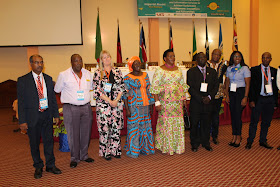LIAZ was represented at the Summit by a six-member team comprising Velenasi Mwale Munsanje, Aggie Kaite Mwanza Mumbi, Raymond Sikanyika, Famous Simpelwe, Debra Mwango Banda and Constantine Mupinde.
The Minister of Arts and Culture in South Africa, Honorable Nathi Mthethwa, officially opened the Summit which was hosted by National Department of Arts and Culture through the National Library of South Africa (NLSA) and Library and Information Association of South Africa (LIASA). Honorable Mthethwa explained that the theme for the Summit was a call to action and a commitment to improve the socio-economic development of African countries and the continent, and emphasized that more coordinated support to libraries would ensure better investment in public library infrastructures.
The two-day Summit saw about ten papers and seven ignite talks being conducted. Zambia made two
 |
| Allan Hagwelele sharing his ignite talk as the sign language interpreter follows |
Mr. Hagwelele was a beneficiary of the IFLA partnership with the Electronic Information for Libraries Public Library Innovation Programme (EIFL-PLIP) and AfLIA to support 15 participants in the second Young African Library Innovators initiative (IYALI) programme. IYALI is a peer learning and international networking experience for African public librarians.
Other key persons that attended the summit included Glòria Pérez-Salmerón , President the International Federation of Library Association and Institutions (IFLA) as well as the IFLA Secretary General, Gerald Leitner. AfLIA’s President John Tsebe as well as the Vice President Mandla Ntombela who is also LIASA President were also in attendance.
The Zambian delegation team also attended the Gala dinner that was hosted to celebrate 200 years of National Library of South Africa and which was also graced by Honorable Minister Mthethwa.
LIAZ Secretary General Aggie Kaite Mumbi represented Zambia during the IFLA Global Vision Meeting for the African region which took place at Onomo Hotel in Durban from 7 – 8th July.




















